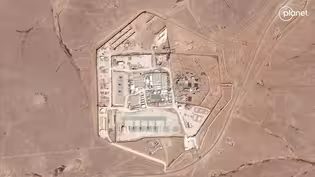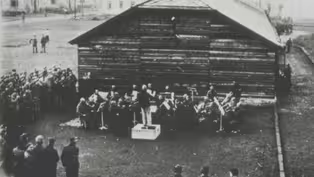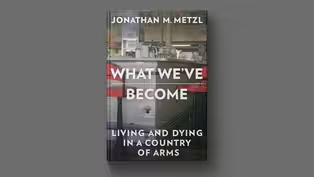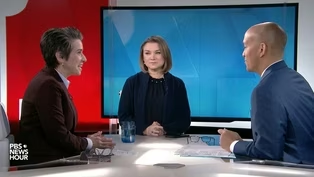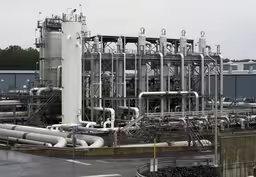
NATO chief discusses future of western support for Ukraine
Clip: 1/29/2024 | 9m 57sVideo has Closed Captions
NATO chief discusses future of western support for Ukraine
Russia's full-scale invasion of Ukraine will soon enter its third year as U.S. support for Ukraine is coming into question because of Republican resistance on Capitol Hill. NATO Secretary-General Jens Stoltenberg, who is in Washington this week, joins Nick Schifrin from the Pentagon to discuss the war in Ukraine and western support for the beleaguered country.
Problems playing video? | Closed Captioning Feedback
Problems playing video? | Closed Captioning Feedback
Major corporate funding for the PBS News Hour is provided by BDO, BNSF, Consumer Cellular, American Cruise Lines, and Raymond James. Funding for the PBS NewsHour Weekend is provided by...

NATO chief discusses future of western support for Ukraine
Clip: 1/29/2024 | 9m 57sVideo has Closed Captions
Russia's full-scale invasion of Ukraine will soon enter its third year as U.S. support for Ukraine is coming into question because of Republican resistance on Capitol Hill. NATO Secretary-General Jens Stoltenberg, who is in Washington this week, joins Nick Schifrin from the Pentagon to discuss the war in Ukraine and western support for the beleaguered country.
Problems playing video? | Closed Captioning Feedback
How to Watch PBS News Hour
PBS News Hour is available to stream on pbs.org and the free PBS App, available on iPhone, Apple TV, Android TV, Android smartphones, Amazon Fire TV, Amazon Fire Tablet, Roku, Samsung Smart TV, and Vizio.
Providing Support for PBS.org
Learn Moreabout PBS online sponsorshipsupport for Ukraine is in question because# of Republican resistance on Capitol Hill.
NATO's secretary-general is# here in Washington this week,## and he spoke with our Nick Schifrin# from the Pentagon a sh NICK SCHIFRIN: Secretary-General Jens Stoltenberg,# welcome back to the "NewsHour."
Thanks very much.
I want to start on the front line in# Ukraine.
Here's what Celeste Wall one of the top U.S. defense officials who# work on Ukraine, told journalists last wee CELESTE WALLANDER, U.S. Assistant# Secretary of Defense: We have heard## reports from the Ukrainian government# that t not -- do not have the stocks and the# stores of ammunition that they require.
NICK SCHIFRIN: From your perspective today, how# short is Ukraine of the weapons it already needs?
JENS STOLTENBERG, NATO Secretary-General:# They need more weapons, and, in particular,## they need more ammunition and# spare parts and sustainment.
And that's exactly why it is important that# the United States, but also all other allies,## commit to long-term support to# Ukraine and ensure that there## is a steady flow of ammunition,# spare parts, weapons to Ukraine.
NICK SCHIFRIN: There are long-term American# contracts that will be going to Ukraine for## the next couple years, but the task at hand# in Washington is that Congress th e $60 billion that the administration# wants to send Ukraine weapons today.
At this point, what do you believe NATO# members are able and willing to do,## given that the U.S. right now cannot send# further weapons short-term to Ukraine?
JENS STOLTENBERG: I believe that# all allies, also the United States,## will continue to provide support to Ukraine.
The U.S. has demonstrated leadership,# provided unprecedented support to but the reality is that actually European# allies have also really stepped up.
And if## you take them altogether, European allies and# Canada, the total support from European all and Canada is actually bigger than# the support from the United States.
And then I see that there is actually# broad support for continued support,## also the United States, in the Congress,# for support to Ukraine.
The challenge is,## of course, that this is linked# to another important issue,## the situation on the border.
It's not for me to# go into there is a way to find an agreement on Ukraine,# where we actually see broad political support.
NICK SCHIFRIN: But as we started this interview# acknowledging Ukraine needs weapons today,## it doesn't even have enough today for what# it needs, and U.S. officials are beginning## to acknowledge that 2024 is likely to be a year# in which Ukraine just needs to hold the line,## and that it's actually 2025, when# American weapons come online,## when more European weapons come online, and, in# fact, Ukrainian weapons as well come onl in the spring of 2025, Ukraine could# be able to launch another offensive.
Is that how you see it?
JENS STOLTENBERG: I will not# go i I think it's important that it's# for Ukraine to comme issues.
Then I think it's extremely# important also to remember where## we started when Russia invaded# Ukraine in 2022, February '22.
At that time, most experts feared that# Ukraine will come under Russian control## within weeks and Kyiv will be taken by# Russia within days.
What we have seen## is actually that Ukraine has been# able to liberate 50 percent of the## land that Russia controlled in the# beginning of the full-fledged war.
They have been able to push back the Russian# fleet from the western part of the Black Sea.
So,## they have opened a corridor for export# of grain and other commodities.
That's## extremely impressive.
And by deep strikes, not# least with the cruise missiles Ki ngdom and France, they are able to continue to# inflict heavy losses on the Russian armed forces.
So, they have achieved a lot, and# they have demonstrated that the## support we provide to them is making a huge# difference on the battlefield every day.
NICK SCHIFRIN: But, today, Ukraine# has still not found a solution for## the defenses that Russia has set up,# especially in Southern Ukraine, right?
JENS STOLTENBERG: Wars are unpredictable and wars## are difficult.
And no one can say exactly# how this war will develop the next year.
But what we do know is that the Ukrainians have# the courage, the determination to defend their## own land.
And we also do know that, when they get# the support from us, they are actually able to## inflict heavy losses and gain also territory# in the fight with invading Russian forces.
We need to stand by Ukraine both in good times,## but also in bad times.
We can not only# be kind good weather th erefore, I count on all allies to# continue to support Ukraine, not least## because it's in our security interest to ensure# that President Putin doesn't win in Ukraine.
If he wins, it will embolden him, but also other# authoritarian leaders, including in China, to## violate international law, use force, and we must# prevent that from happening by supporting Ukraine.
NICK SCHIFRIN: Let's talk about political support# for Ukraine.
Last summer in Vilnius, NATO members## dropped the requirement for Ukraine to complete# a Membership Action Plan before Will there be more concrete measures# taken at the summit in Washington in## July for NATO's 75th anniversary that# will actually send the message to## both Kyiv and Moscow that this war# will end with Ukraine inside NATO?
JENS STOLTENBERG: I cannot preempt the exact# conclusions from the Washington summit, but,## first of all, that will be an# important summit, where we are## going to mark the 75th anniversary of# the most successfu And I expect that allies will agree further# steps to move Ukraine even closer to NATO.## Ukraine will become a member of this alliance.# That has been clearly stated by all allies.
And we have moved them closer by turning# a two-step process into one-step process## before they can become a member, which actually# shortened the path to membership, by establishing## something called the Nato-Ukraine Council, where# we are deepening the political cooperation, and## by helping them to ensure that the Ukrainian armed# forces are fully interoperable with NATO forces.
All of this is moving Ukraine closer to NATO,# demonstrating that Putin made a big mistake.## He wanted to control Ukraine, prevent Ukraine# from moving towards E.U.
and NATO membership.## He's getting exactly the opposite.
Ukraine is# closer both to E.U.
and NATO than ever before.
NICK SCHIFRIN: Sir, let me ask you about# a little American politics, if I may.
Donald Trump, of course, has won# the first two Republican contests## in the United States.
We went back# to the archive and found this moment## from a breakfast you held with# the former president in 2018.
DONALD TRUMP, Former President# of the United States (R) and## is captive to Russia becau Russia.
So we're supposed to protect Germany,# but they're getting their energy from Russia.
Explain that.
And it can't# be explained.
You know that.
NICK SCHIFRIN: My first question is,## does tha JENS STOLTENBERG: Well, I'm the secretary-general# of NATO, responsible for working with 31## allies.
And, of course, allies elect different# political -- select different political leaders.
The strength of these allies is that, despite# differences, despite different political parties## in power in different countries on both sides# of the Atlantic, we have always been able to## unite around our core task to protect and# defend each other.
And I expect that to## continue to be the case, because it is a great# advantage for the United States to have NATO.
NATO is important for European security, but NATO# is also important for the United States.
Together,## we represent 50 percent of the# world's GDP and 50 percent of## the world's military might.
And that# makes also the United States stronger.
NICK SCHIFRIN: The U.S.' European allies,# some governments are making contingency## plans if Donald Trump were to become# president again and withdraw from N Is NATO making those contingency plans?
JENS STOLTENBERG: I'm confident that the# United States will remain a committed## NATO allies -- ally, because it is in the# interest of the United States, not least## when they see the size of the military buildup# in China and the size of the Chinese economy.
I also see broad bipartisan support for NATO in# the United States.
And then, when you listen to## what former President Trump has stated many# times, his primary criticism is not about## NATO.
It's about NATO allies not spending enough# on NATO, not investing enough in -- on defense.
And, there, we have a good story# to tell.
Over the last years,## all allies have increased defense spending.# More spending 2 percent of GDP.
And, in total,# they have added 450 billion U.S. dollars.
NICK SCHIFRIN: Yes.
for more defense spending.
They were# right, NICK SCHIFRIN: Jens Stoltenberg,# secretary-general of NATO, thank you very much.
JENS STOLTENBERG: Thank you.
Biden vows to respond to drone attack on U.S. base in Jordan
Video has Closed Captions
Clip: 1/29/2024 | 7m 23s | Biden vows to respond to drone attack on U.S. base in Jordan (7m 23s)
Minneapolis chamber group plays music written at Auschwitz
Video has Closed Captions
Clip: 1/29/2024 | 8m 1s | Minneapolis chamber group performs music written by Polish prisoners at Auschwitz (8m 1s)
Psychiatrist pushes for reforms on U.S. gun safety approach
Video has Closed Captions
Clip: 1/29/2024 | 7m 36s | Psychiatrist advocates for reforming U.S. approach to gun safety (7m 36s)
Tamara Keith and Amy Walter on a border deal, the 2024 race
Video has Closed Captions
Clip: 1/29/2024 | 8m 23s | Tamara Keith and Amy Walter on a border deal and Nikki Haley's presidential run (8m 23s)
White House halts natural gas, exports over climate concerns
Video has Closed Captions
Clip: 1/29/2024 | 6m 46s | White House halts major liquid natural gas project and new exports over climate concerns (6m 46s)
Providing Support for PBS.org
Learn Moreabout PBS online sponsorship
- News and Public Affairs

FRONTLINE is investigative journalism that questions, explains and changes our world.

- News and Public Affairs

Amanpour and Company features conversations with leaders and decision makers.












Support for PBS provided by:
Major corporate funding for the PBS News Hour is provided by BDO, BNSF, Consumer Cellular, American Cruise Lines, and Raymond James. Funding for the PBS NewsHour Weekend is provided by...

